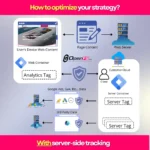What is SEO AI and How Does It Work? Understanding the Future of Search Optimization
If you’ve been keeping up with digital marketing lately, you’ve probably noticed that AI is everywhere. But when it comes to SEO, things get particularly interesting. SEO AI isn’t just another buzzword—it’s fundamentally changing how we approach search engine optimization, and I’m here to break down exactly what it means for your business.
Think of SEO AI as your incredibly smart assistant who never sleeps, constantly analyzes millions of data points, and spots opportunities you’d never find on your own. While traditional SEO methods still matter, AI-powered tools are taking the guesswork out of optimization and delivering results that would’ve seemed impossible just a few years ago.
The Evolution of SEO: How AI is Transforming Search Engine Optimization
Let me paint you a picture of how SEO has evolved. Back in the day, we’d spend hours manually researching keywords, analyzing competitors one by one, and basically throwing strategies at the wall to see what stuck. Don’t get me wrong—those fundamentals still matter. But now, AI has entered the chat, and it’s like upgrading from a bicycle to a rocket ship.
SEO AI combines the power of artificial intelligence with proven optimization strategies to create something entirely new. Instead of relying solely on manual processes and educated guesses, these intelligent systems analyze massive datasets in seconds, identify patterns humans would miss, and provide insights that are both accurate and actionable. It’s not about replacing human expertise—it’s about amplifying it.
Core Technologies Behind AI-Powered SEO Systems
The magic happens through several sophisticated technologies working together. Machine learning algorithms are the backbone, constantly learning from search patterns and user behavior to predict what works and what doesn’t. These systems get smarter every day, analyzing billions of searches to understand exactly what search engines and users want.
Natural Language Processing (NLP) is another game-changer. It helps AI understand context, intent, and meaning behind searches—not just keywords. This means your content can be optimized for how people actually search, not just for specific keyword combinations. Add predictive analytics to the mix, and you’ve got a system that can forecast SEO trends before they fully emerge, giving you a competitive edge that’s hard to beat.
Breaking Down How SEO AI Actually Works in Practice
So how does this technology actually work when you’re using it day-to-day? The process is surprisingly elegant. SEO AI platforms continuously monitor and analyze data from multiple sources—your website, competitors, search engines, and user behavior patterns. They’re essentially running thousands of experiments simultaneously, learning what drives results in real-time.
What makes this particularly powerful is the automation aspect. While you’re sleeping, these systems are working, adjusting, and optimizing. They identify technical issues before they impact rankings, spot content opportunities based on emerging trends, and even predict which optimization strategies will yield the best ROI. It’s like having a team of SEO experts working around the clock, but with the processing power of a supercomputer.
Essential Functions of Modern SEO AI Platforms
The capabilities of today’s SEO AI tools would’ve seemed like science fiction not long ago. They analyze your competitors’ entire digital footprint, identifying gaps and opportunities you can exploit. When it comes to content, they don’t just suggest keywords—they recommend entire content strategies based on search intent, user behavior, and competitive analysis.
On the technical side, these platforms automatically audit your site, flagging issues that could hurt your rankings and providing specific fixes. They monitor your rankings in real-time across thousands of keywords and locations, adjusting strategies based on what’s working. Perhaps most impressively, they can predict which changes will have the biggest impact on your visibility, helping you prioritize efforts for maximum results.
Real-World Applications: How Businesses Use SEO AI for Digital Success
Let me share how businesses are actually using this technology to transform their digital presence. One of my clients, a local e-commerce store, was struggling to compete with larger retailers. After implementing SEO AI tools, they discovered untapped long-tail keywords their competitors had missed. Within six months, their organic traffic increased by 150%, and more importantly, their conversion rates improved because they were attracting more qualified visitors.
Another fascinating application is in content optimization. Rather than guessing what topics to cover, AI tools analyze search trends, user questions, and content gaps to suggest exactly what your audience wants to read. This isn’t about keyword stuffing—it’s about creating genuinely helpful content that search engines and users love. For businesses looking to improve their SEO content strategy, AI provides a clear roadmap based on data, not hunches.
AI-Driven Content Creation and Optimization Strategies
The content game has completely changed with AI. These tools don’t just tell you what keywords to use—they analyze top-performing content in your niche and reveal the exact structure, topics, and depth that resonates with your audience. They can identify semantic keywords and related topics that strengthen your content’s relevance without awkward keyword cramming.
What’s really cool is how AI helps with content refreshing. It identifies which existing pages have the potential to rank higher with minor updates, suggesting specific improvements based on current ranking factors. This means you’re not always creating from scratch—sometimes a few strategic tweaks to existing content can dramatically boost your visibility. The tools even analyze user engagement metrics to understand what content formats and structures keep people on your page longer.
Technical SEO Automation: Letting AI Handle the Heavy Lifting
Technical SEO can be a nightmare, especially if you’re not technically inclined. This is where SEO AI really shines. These systems continuously crawl your site, identifying issues like broken links, slow-loading pages, or mobile optimization problems before they impact your rankings. They don’t just find problems—they prioritize them based on potential impact and often provide one-click fixes.
Schema markup implementation, which helps search engines understand your content better, becomes almost effortless with AI assistance. The technology analyzes your content and automatically suggests the most appropriate schema types, even generating the code for you. For businesses focused on technical SEO improvement, AI tools are invaluable time-savers that ensure nothing falls through the cracks.
Understanding SEO AI’s Impact on Search Rankings and Visibility
Now, let’s talk results—because that’s what really matters, right? The impact of SEO AI on search rankings has been nothing short of remarkable for businesses that implement it correctly. I’ve seen websites jump from page three to page one within weeks of implementing AI-driven optimizations, simply because the technology identified and fixed issues humans had overlooked for months.
But it’s not just about rankings. SEO AI helps improve the quality of traffic you’re attracting. By better understanding search intent and optimizing accordingly, businesses see higher engagement rates, longer session durations, and ultimately, better conversions. It’s the difference between attracting 1,000 random visitors and 100 people actively looking for exactly what you offer.
Measuring Performance: Key Metrics and Ranking Factors
The beauty of AI-powered SEO is in the measurement. These platforms track everything—and I mean everything. From traditional metrics like keyword rankings and organic traffic to more nuanced indicators like content relevancy scores and user intent matching, you get a complete picture of your SEO performance. This comprehensive tracking helps you understand not just if your SEO is working, but why it’s working.
What’s particularly valuable is how AI tools correlate different metrics to show cause and effect. They might reveal that improving your page load speed by just one second increased your average session duration by 30%, which in turn boosted your rankings for competitive keywords. This level of insight helps you make informed decisions about where to invest your time and resources for maximum impact.
Best Practices for Implementing SEO AI in Your Digital Strategy
Here’s the thing about implementing SEO AI—you can’t just flip a switch and expect miracles. Success requires a thoughtful approach that balances automation with human insight. Start small, perhaps focusing on one aspect like keyword research or technical audits, then gradually expand as you become comfortable with the technology.
The most successful implementations I’ve seen maintain a human-in-the-loop approach. While AI provides incredible insights and automation, human creativity and strategic thinking remain irreplaceable. Use AI to handle the heavy lifting of data analysis and routine tasks, freeing yourself to focus on strategy, creativity, and building genuine connections with your audience. For those interested in developing a comprehensive SEO strategy for 2025, combining AI tools with human expertise is the winning formula.
Strategic Integration: Blending AI Tools with Human Expertise
The key to successful SEO AI implementation lies in gradual integration. Don’t try to automate everything at once. Instead, identify your biggest pain points—maybe it’s keyword research or competitor analysis—and start there. As you see results and gain confidence, expand the AI’s role in your SEO workflow.
Remember to regularly review and validate AI recommendations. While these tools are incredibly sophisticated, they don’t understand your business context, brand voice, or unique value proposition like you do. Use AI insights as a starting point, then apply your industry knowledge and creativity to refine the strategies. This hybrid approach consistently delivers the best results, combining the processing power of AI with the nuanced understanding only humans can provide.
Future Trends: Where SEO AI Technology is Heading Next
Looking ahead, the future of SEO AI is incredibly exciting. We’re moving toward even more sophisticated systems that can understand and optimize for voice search, which is rapidly growing as smart speakers become ubiquitous. Visual search optimization is another frontier, with AI learning to understand and optimize images and videos for search engines in ways we’re just beginning to explore.
Predictive search intent analysis is getting scary good. Soon, AI will not only understand what users are searching for now but predict what they’ll search for next, allowing businesses to create content that meets needs before they’re fully formed. The integration with generative AI in digital marketing is opening new possibilities for personalized, dynamic content that adapts to individual user preferences in real-time.
Emerging Technologies Shaping the Future of Search Optimization
The convergence of AI technologies is creating opportunities we couldn’t have imagined. Machine learning models are becoming more sophisticated at understanding context and nuance, moving beyond simple keyword matching to true semantic understanding. This means SEO will become less about gaming the system and more about genuinely serving user needs.
Personalization is another huge trend. AI is getting better at understanding individual user preferences and search patterns, which means SEO strategies will need to account for increasingly personalized search results. The businesses that win will be those that use AI to create diverse, comprehensive content strategies that can appeal to different user segments while maintaining consistency and quality.
Overcoming Common Challenges in SEO AI Implementation
Let’s be real—implementing SEO AI isn’t always smooth sailing. One of the biggest challenges I see businesses face is data quality. AI is only as good as the data it’s fed, and if your analytics are misconfigured or your data is incomplete, you’ll get subpar results. That’s why it’s crucial to ensure your tracking and data collection are properly set up before diving into AI-powered optimization.
Another common hurdle is integration with existing systems. Many businesses have established workflows and tools, and adding AI to the mix can feel disruptive. The key is choosing AI platforms that play nicely with your current stack. Look for tools with robust APIs and integration options. And don’t forget about the human element—your team needs proper training to effectively use these new tools. For businesses looking to enhance their overall SEO approach, addressing these challenges upfront saves headaches down the road.
Practical Solutions for Common Implementation Obstacles
When it comes to data quality issues, start with a comprehensive audit of your current analytics setup. Make sure you’re tracking the right metrics and that your data is clean and consistent. Many AI tools offer data validation features—use them. If you’re seeing weird results or recommendations that don’t make sense, it’s often a data problem, not an AI problem.
For integration challenges, take an incremental approach. Don’t try to replace your entire SEO workflow overnight. Instead, identify one process that’s particularly time-consuming or inefficient, and start by automating that. As your team gets comfortable and sees results, gradually expand the AI’s role. And remember, most reputable AI SEO platforms offer extensive support and training resources—take advantage of them.
Measuring ROI: How to Track SEO AI Success Effectively
Here’s where many businesses stumble—they implement fancy AI tools but don’t properly track whether they’re actually delivering value. Measuring SEO AI success requires looking beyond traditional metrics. Yes, rankings and traffic matter, but you need to dig deeper. Are you attracting more qualified visitors? Is your content resonating better with your audience? Are you saving time on routine tasks that can be reinvested in strategy?
I always recommend establishing baseline metrics before implementing AI tools. Track not just your rankings and traffic, but also the time spent on various SEO tasks, the number of optimization opportunities identified, and the speed of implementation. This gives you a clear before-and-after picture that demonstrates real ROI. For businesses focused on conversion rate optimization, connecting SEO improvements to actual business outcomes is crucial.
Key Performance Indicators for AI-Powered SEO Campaigns
When tracking SEO AI performance, focus on both efficiency and effectiveness metrics. Efficiency metrics include time saved on keyword research, number of technical issues automatically identified and fixed, and speed of content optimization. These show how AI is streamlining your processes. Effectiveness metrics—organic traffic growth, keyword ranking improvements, and most importantly, conversion rates—demonstrate actual business impact.
Don’t forget about competitive metrics either. Track how your visibility compares to competitors over time, monitor share of voice for important keywords, and analyze how quickly you can respond to algorithm changes compared to others in your space. The combination of these metrics provides a comprehensive view of your SEO AI investment’s true value.
Selecting the Right SEO AI Tools for Your Business Needs
Choosing the right SEO AI platform can feel overwhelming—there are dozens of options, each claiming to be the best. Here’s my advice: start with your specific needs and constraints. Are you primarily focused on content optimization? Technical SEO? Competitor analysis? Different tools excel in different areas, so knowing your priorities helps narrow the field.
Budget is obviously a factor, but don’t just look at the sticker price. Consider the total value—time saved, additional revenue generated, and reduced need for multiple separate tools. Many businesses find that a comprehensive AI platform actually costs less than their previous hodgepodge of individual tools. Also, pay attention to the learning curve. The most powerful tool in the world is useless if your team can’t or won’t use it effectively.
Essential Features and Evaluation Criteria for SEO AI Platforms
When evaluating SEO AI tools, look for platforms that offer comprehensive data analysis capabilities, not just surface-level insights. The best tools provide actionable recommendations, not just reports. They should integrate smoothly with your existing tech stack—whether that’s Google Analytics, your CMS, or other marketing tools. Real-time monitoring and alerts are crucial for staying ahead of issues before they impact your rankings.
Support and training resources matter more than you might think. Look for platforms that offer robust documentation, responsive customer support, and ideally, a community of users you can learn from. Scalability is another key consideration—choose a tool that can grow with your business. And don’t forget to test drive options through free trials or demos before committing. The best SEO AI tool is the one your team will actually use consistently.
Frequently Asked Questions About SEO AI
What exactly is SEO AI, and how is it different from traditional SEO tools?
SEO AI refers to search engine optimization tools and platforms that use artificial intelligence and machine learning to analyze data, identify patterns, and provide optimization recommendations. Unlike traditional SEO tools that rely on static rules and manual analysis, AI-powered tools continuously learn and adapt, offering more sophisticated insights and automation capabilities. They can process vastly more data and identify opportunities that human analysts might miss.
How much does SEO AI typically cost for small businesses?
SEO AI tools range from around $50 per month for basic platforms to several thousand dollars monthly for enterprise solutions. Most small businesses find success with tools in the $200-500 monthly range, which offer robust features without breaking the bank. Many platforms offer tiered pricing, so you can start small and upgrade as your needs grow. Remember to factor in the time savings and potential revenue increases when evaluating cost.
Can SEO AI completely replace human SEO professionals?
No, SEO AI is designed to augment human expertise, not replace it. While AI excels at data analysis, pattern recognition, and routine optimization tasks, it lacks the creativity, strategic thinking, and contextual understanding that human professionals bring. The most effective approach combines AI’s analytical power with human insight, creativity, and industry knowledge. Think of AI as a incredibly powerful assistant, not a replacement.
How long does it take to see results from implementing SEO AI?
Results timeline varies depending on your starting point and the specific optimizations implemented. Some improvements, like technical fixes, can show results within days or weeks. Content optimizations typically take 2-3 months to fully impact rankings. Overall, most businesses see significant improvements within 3-6 months of implementing SEO AI tools, with continued gains as the AI learns more about your specific situation.
What are the main risks or downsides of using SEO AI?
The primary risks include over-reliance on automation without human oversight, potential for generating generic or low-quality content if not properly configured, and the possibility of following recommendations that don’t align with your brand or business goals. There’s also the risk of data privacy concerns and the need for ongoing investment in tools and training. Mitigate these risks by maintaining human oversight and choosing reputable platforms with strong security measures.
Is SEO AI suitable for local businesses or just large enterprises?
SEO AI is absolutely suitable for local businesses—in fact, it can be particularly powerful for local SEO. AI tools can help identify local search opportunities, optimize for voice searches (which are often local in nature), and manage listings across multiple platforms efficiently. Many AI platforms offer specific features for local businesses, making it easier than ever for small, local companies to compete effectively in search results. Check out our guide on local SEO for small businesses to learn more.
 Written by: Romulo Vargas Betancourt
Written by: Romulo Vargas Betancourt
CEO – OpenFS LLC







